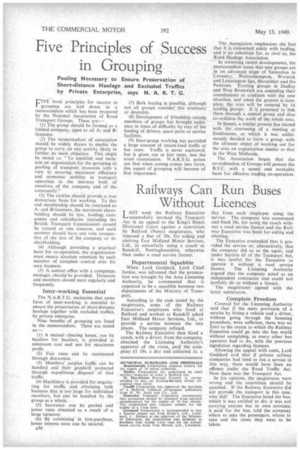Five Principles of Success in Grouping
Page 24

If you've noticed an error in this article please click here to report it so we can fix it.
Pooling Necessary to Ensure Preservation of Short-distance Haulage and Excluded Traffics by Private Enterprise, says N. A. R. T. G.
CIVE basic principles for success in grouping are laid down in a memorandum which has been prepared by the National Association of Road Transport Groups. These are:— (1) The group should be formed as a limited company, open to all Aand Blicensees.
;-2) The memorandum of association should be Widely drawn to enable the group to carry on any activity likely to further its main' objective. This might be stated ass: "To establish and maintain an organization for the grouping or pooling of transport resources with a view to securing , maximum efficiency and economic stability in transport operation in the interests both of members of the company and of the community."
(3) The articles should provide a true democratic basis for working. To this end Membership should be _restricted to Aand B-licensees, the maximum shareholding should be low, holding. companies and subsidiaries (including the British TransportCommission) should be treated as one concern, and each member should have one vote irrespective of the size of the company or its shareholding.
(4) Although providing a practical basis for co-operation, the organization must ensure absolute retention by each member of complete control over his own business.
(5) A central office with a competent manager, should be provided. Directors and members should meet regularly and frequently.
Inter-working Essential
The N.A.R.T.G. maintains that some form of inter-working is essential to ensure the preservation of short-distance haulage together with excluded traffics, by private enterprise.
Nine benefits of grouping are listed in the memorandum. These are stated as:—
(1) A mutual clearing house, run by hauliers for hauliers, is provided at minimum cost and not for maximum profit.
(2) Fair rates can be maintained through discussion.
(3) Members' surplus traffic can be handled and their goodwill protected through expeditious disposal of that traffic.
(4) Machinery is provided for negotiating for traffic and obtaining bulk business that is too large for individual members, but can be handled by the group as a whale.
(5) Insurance can be pooled and lower rates obtained as a result of a large turnover.
(6) By combining in hire-purchase, lower interest rates can be secured. A36 (7) Bulk buying is possible, although not all groups consider' this necessary or desirable.
(8) Development of friendship among members of groups has brought assistance in times of difficulty by way of the lending of drivers, spare parts or service facilities.
(9) Inter-group working has provided a large amount of return-load traffic at fair rates. Traffic is never auctioned, but is given out at fair rates, less the usual commission. N.A.R.T.G. points out that when zoning comes into force, this aspect of grouping will become of first importance. The Association emphasizes the fact that it is concerned solely with trading, and is no substitute for, or rival to, the Road Haulage As'sociation.
In reviewing recent developments, the inernorandurn states that new groups are in an. advanced stage of 'formation in Coventry,' Wolverhampton, Warwick and Leamington Spa, Shropshire and the Potteries. Existing groups in Dudley and West Bromwich are amending their constitutions to -conform with the new situation, and when the process is complete, the area will be covered by 14 trading 'groups: It is proposed to link them through a central group and thus co-ordinate the work of the whole area.
In Sussex, a similar process has started with the convening of a meeting at Eastbourne, at which it was uninimously decided to form a group, with the ultimate object of working out for the area an organization similar to that in the West Midlands.
The Association hopes that the co-ordination of Groups will present the B.T.C. with a sound and workable basis for effective trading co-operation.


























